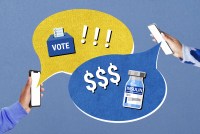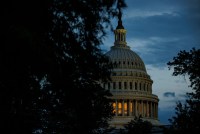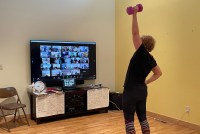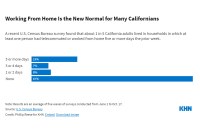Latest KFF Health News Stories
Ante vacío federal, estados promueven leyes duras contra el uso de sustancias tóxicas en cosméticos
Las hispanas y asiáticas han informado que usan más cosméticos en general que las mujeres negras y blancas no hispanas.
States Seek Crackdown on Toxic Ingredients in Cosmetics to Close Gaps in Federal Oversight
Washington state regulators found formaldehyde, lead, and arsenic in lipstick, powder foundations, skin lotions, and hair products marketed to and popular with women of color. Now legislators there are seeking to ban the products and, like at least a dozen other states, make up for lax federal rules.
A Bitter Battle Over the ‘Orphan Drug’ Program Leaves Patients’ Pocketbooks at Risk
Patients who depend upon special drugs to treat rare diseases are caught in the crossfire as drugmakers and the FDA battle over regulations that reward companies for developing treatments for relatively small pools of patients.
Republican Lawmakers Shy Away From Changing Montana’s Constitutional Right to Abortion
Lawmakers in 14 states have passed near-total bans on abortion since the U.S. Supreme Court overturned Roe v. Wade. But in some conservative-led states where court rulings determined their constitutions protect abortion, including Montana, politicians haven’t asked voters to weigh in.
Armed With Hashtags, These Activists Made Insulin Prices a Presidential Talking Point
Twitter has been a hotbed for the burgeoning insulin access movement and activism surrounding other medical conditions. For people with diabetes, the platform has helped propel concern about insulin prices into policy. Can it continue to win with hashtags?
Abortion Debate Ramps Up in States as Congress Deadlocks
Abortion is a top issue for state lawmakers meeting for their first full sessions since Roe v. Wade was overturned.
Rural Seniors Benefit From Pandemic-Driven Remote Fitness Boom
When the pandemic began, senior service agencies hustled to rework health classes to include virtual options for older adults. Now that isolation has ended, virtual classes remain. For seniors in rural areas, those classes have broadened access to supervised physical activity.
The Official Who Investigates Suspicious Deaths in Your Town May Be a Doctor — Or Not
Across the country, there are no consistent requirements for the officials who investigate suspicious and unexpected deaths. Some have no medical training, others are doctors trained in forensic pathology. Washington, California, Illinois, and Georgia are among the states that have recently attempted to make changes — with mixed success.
How Medicare Advantage Plans Dodged Auditors and Overcharged Taxpayers by Millions
Facing rare scrutiny from federal auditors, some Medicare Advantage health plans failed to produce any records to justify their payments, government records show. The audits revealed millions of dollars in overcharges to Medicare over three years.
KHN Investigation: The System Feds Rely On to Stop Repeat Health Fraud Is Broken
A months-long KHN examination of the system meant to bar fraudsters from Medicaid, Medicare, and other federal health programs found gaping holes and expansive gray areas through which banned individuals slip to repeatedly bilk taxpayer-funded programs.
A Work-From-Home Culture Takes Root in California
New U.S. Census Bureau data shows a large segment of Californians are working from home for part or all of the week. Researchers say the shift will ripple through the broader economy in ways big and small.
How Banks and Private Equity Cash In When Patients Can’t Pay Their Medical Bills
Hospitals strike deals with financing companies, generating profits for lenders, and more debt for patients.
States Opting Out of a Federal Program That Tracks Teen Behavior as Youth Mental Health Worsens
Colorado, Florida, and Idaho are the latest states to opt out of a survey that tracks concerning behaviors in high school students. Officials cite low participation and state laws that require parental permission. But some advocates say dwindling state participation is an “enormous loss” that will make it harder to track signs of poor mental health — like drug and alcohol misuse and suicidal ideation — among teens.
Drivers in Decline: A Shortage of Volunteers Complicates Access to Care in Rural America
Public transit is already insufficient in rural areas, leaving residents with few options as they travel greater distances to access health care. But older residents who depend on volunteer drivers to get them to appointments face another challenge: The number of those volunteers is declining.
‘American Diagnosis’: When Indigenous People Move to Cities, Health Care Funding Doesn’t Follow
When Indigenous people started moving to cities in large numbers after World War II, many found hardship and discrimination there … but not the health care they were entitled to. Episode 12, the season finale, explores the efforts of urban Indian health providers to close those gaps by providing affordable, culturally competent care.
Hemp-Derived Delta-8 Skirts Marijuana Laws and Raises Health Concerns
A cannabis product called delta-8 was made legal when the 2018 Farm Bill legalized hemp. But unlike its cousin CBD, delta-8 has psychoactive properties. And the FDA warns it has “serious health risks.” The agency has received more than 100 reports of bad reactions among people who consumed it.
Algunos estados permiten que se utilicen en estudios de investigación, a veces por parte de terceros a cambio de una cuota, o que se proporcionen al personal policial que investiga un delito.
Newborns Get Routine Heel Blood Tests, but Should States Keep Those Samples?
Shortly after birth, babies are pricked in the heel so their blood can be tested for life-threatening conditions. States generally save leftover blood from those samples, and parents and privacy experts are concerned that information could be used without consent years later.
When Mental Illness Leads to Dropped Charges, Patients Often Go Without Stabilizing Care
When criminal suspects are deemed too mentally ill to go through the court process and their charges are dropped, they can be left without stabilizing treatment — and sometimes end up being charged with additional crimes.
Conservative Blocs Unleash Litigation to Curb Public Health Powers
Spurred on by opposition to pandemic-related health mandates, a coalition of religious liberty groups, conservative think tanks, and Republican state attorneys general has filed a cascade of litigation seeking to rein in the powers of public health authorities.
























